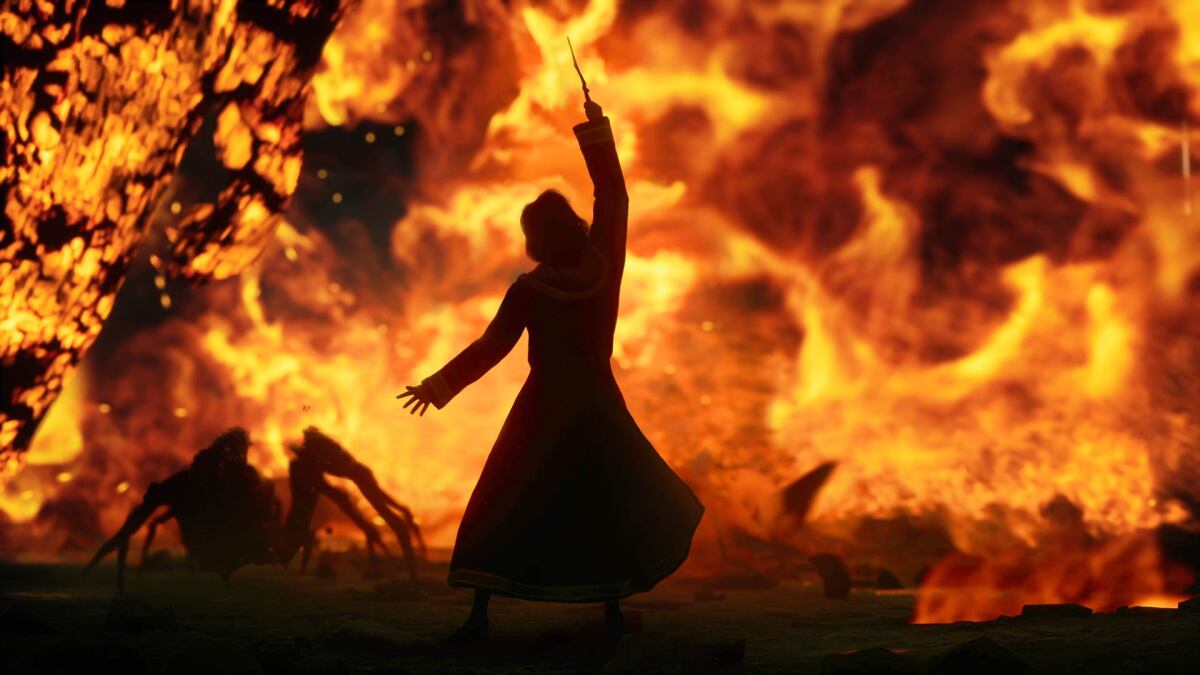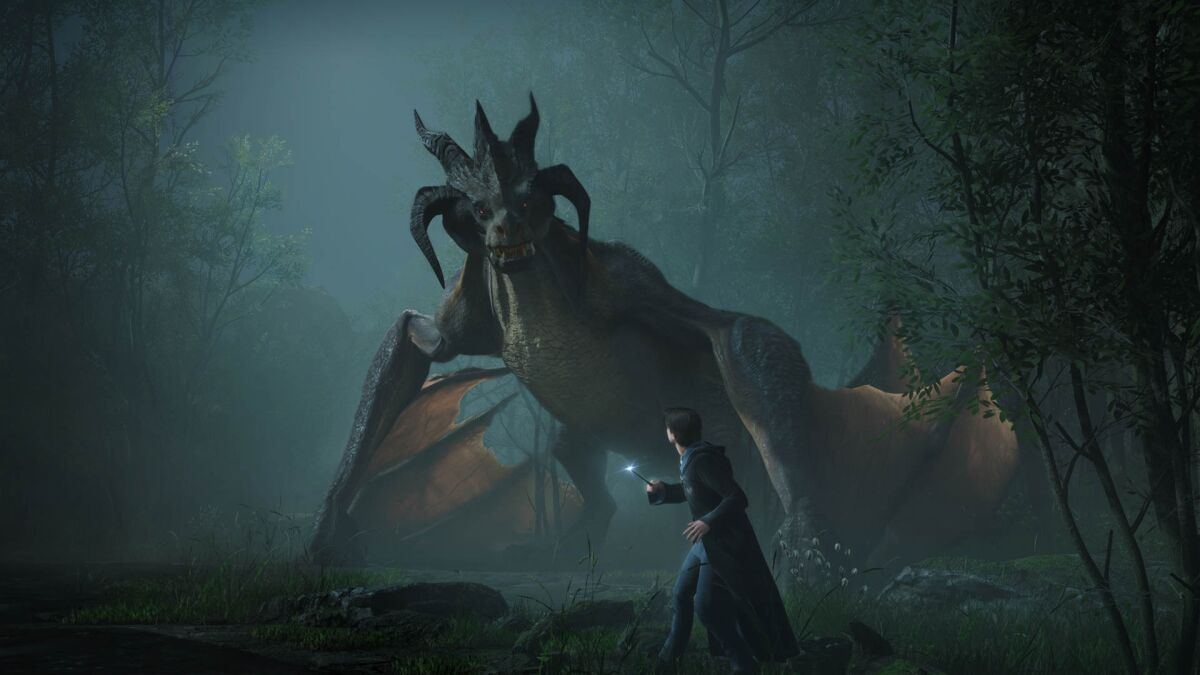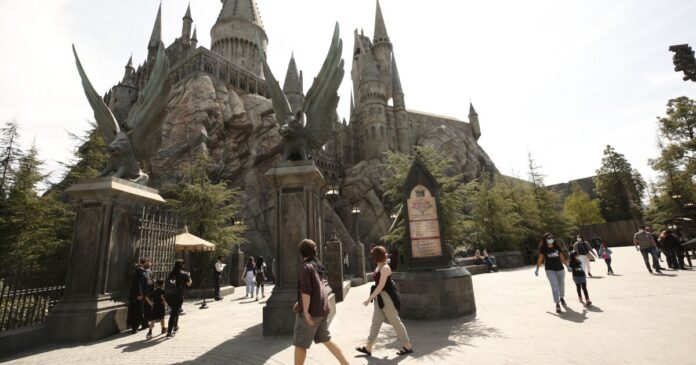The night before visiting the Wizarding World of Harry Potter at Universal Studios Hollywood, Brittany Katter wondered whether the journey was a mistake.
The “Harry Potter” universe created by author J.K. Rowling has been a part of her life for nearly 25 years, but renewed controversy around the author and a new video game based in her world gave Katter pause.
She had long put off a visit, but her deep attachment to the fantasy world eventually won out.
“I started reading ‘Harry Potter’ when I was 11,” Katter, 36, said as she unwrapped a new wand in one of the theme park’s hidden alleyways. “It pretty much represents an escape and a safe place. I started listening to it as an adult again, and it was a complete stress relief during a tumultuous time.”
But more than two decades after the first book’s release, not every reader who grew up envisioning the halls of Hogwarts and sipping Butterbeer in Hogsmeade still considers the world of “Harry Potter” a safe space.
For weeks, a battle has brewed among gamers as parts of the community have called for a boycott of “Hogwarts Legacy,” a game set roughly 100 years before the events of the “Harry Potter” books. The debate, first sparked when the game was announced in 2020 and renewed amid its release this month, centers on a moral question: Can fans support “Hogwarts Legacy” and the “Harry Potter” franchise while also condemning Rowling‘s comments on transgender people and gender identity?
The author’s views, shared online over the last three years, have been widely critiqued as transphobic, leading many fans to wrestle with their nostalgia and attachment to a narrative that for years brought them joy and a sense of belonging.
A long-awaited, big-budget role-playing game from Warner Bros. Games subsidiary Avalanche Software, “Hogwarts Legacy” has raised questions about separating art from the artist and about what our pop cultural consumption says about our beliefs.
Critics have called the author’s opinions — and consumers’ support for the game — dangerous at a time when a wave of anti-LGBTQ bills have been introduced in state legislatures across the country. Many who love the “Potter” world agree with that criticism but argue that it is the fans who truly brought the universe to life. .
“Nothing can touch that,” Katter said. “The political opinions that she has that are harmful can’t touch that.”
Exploring the Wizarding World, she added, could help show the world that the “Harry Potter” fandom is bigger and more inclusive than any beliefs held by the fictional world’s creator.
For Dylan Whitaker, the “Potter” universe is alluring because it “makes you question what’s real and your way of thinking.”
“She obviously is quite associated with the brand, but I feel the brand is larger than her now,” Whitaker, 31, said of Rowling in the midst of snapping smartphone pics of Universal’s take on Hogsmeade. “Creators can make content that’s inclusive to everyone, and maybe not so much like, ‘This is J.K. Rowling’s thing.’ Stay away from that, and the fun can go on.”
Despite the debate, analysts believe calls to boycott the game won’t harm sales. Although official sales figures have not been released, “Hogwarts Legacy” has consistently led the sales chart on the video game digital distribution service Steam since its release last week. Reports out of the United Kingdom show the game had the largest launch for a “Harry Potter”-themed game to date.
Michael Pachter, a research analyst with Wedbush Securities, said that the fracas over “Hogwarts Legacy” could impact sales by about 10 percentage points.

New game “Hogwart’s Legacy,” set in the world of “Harry Potter” but significantly before the events of the books and films, is expected to be one of the biggest games of 2023.
(Avalanche / WB Games)
“If the game was to sell 5 million units, it’ll sell 4.5, something like that,” he said. “And you’ll never know. We won’t be able to discern the difference. I don’t think enough people care that there will be a widespread mass boycott, with people marching, thousands of people showing up with signs in front of Warner Bros.’ gates.”
The game also has timing on its side, Pachter added, because games released in the spring “tend to do very well” due to a lack of competition.
Andrew Uerkwitz, senior analyst at Jefferies, said that the debate around “Hogwarts Legacy” has driven awareness for the game, ultimately acting as free marketing.
“Yes, there’s been controversy … but it doesn’t take away from how beloved ‘Harry Potter’ and the ‘Harry Potter’ universe is,” he said. “Based on sales and Metacritic scores and user scores, the game has met or exceeded the quality expectations.”
Still, the controversy hasn’t stopped fans and critics alike from making personal attacks against each other online. Video game publications have grappled over whether they should even review “Hogwarts Legacy.”
Game website IGN included a note with its review, which largely sidestepped the controversy, arguing instead that the role of the critic is “to answer the question of whether or not we find ‘Hogwarts Legacy’ to be fun to play and why; whether it’s ethical to play is a separate but still very important question.” GameSpot, meanwhile, greeted the game’s launch with a primer on transgender charities and a detailed essay that outlined Rowling’s comments and how the trans community views them, ultimately asking players to stand in solidarity with their trans peers.
Those who decide to play have found themselves having to justify the decision.
When Samira Early turned on her Twitch stream on a recent weekday and logged into “Hogwarts Legacy,” comments on the boycott trickled into her stream as she battled a large armored troll, dodging attacks and hurling spells.
“Dude, just play the game if you want to play it. I’m a trans girl. I love ‘Harry Potter.’ I hate J.K. Rowling,” Early, who streams under the Twitch handle TheYishai, told nearly 10,000 watchers. “It’s a ‘Harry Potter’ game. It’s about [expletive] wizards.”
Roughly 1.28 million people watched “Hogwarts Legacy” content on Twitch last Thursday ahead of its official Feb. 10 release, according to the game’s developers — making it the highest-watched single-player game ever on the platform.
It’s up to each gamer to decide whether they want to avoid the game, Early said. She respects that other people don’t want to play or put their money toward a game that Rowling profits from, she said, but the online attacks on streamers who do enjoy “Hogwarts Legacy” cross a line.
“I got called a bigot. I got called transphobic, homophobic,” she said in an interview. “I got called a piece of human garbage. I got called total scum — that’s just to name a few.”
Gemma Stone, co-founder of the site Trans Writes, said she understands why the game has such wide appeal: The “Harry Potter” universe has long lacked an expansive role-playing game like “Hogwarts Legacy.”

Some called for a boycott of “Hogwart’s Legacy” due to the controversial statements made by “Harry Potter” author J.K. Rowling.
(Avalanche Software / WB Games)
Set long before the events of the core books, the game follows a similar heroic plot with a deep dedication to detail. Players can spend hours exploring the halls and rooms of Hogwarts before stepping outside the castle.
Stone used to be a fan of the older “Harry Potter” video games, many of which don’t have the best critical reputation.
“I get why the game is so popular,” Stone said. “It’s that thing that our generation of gamers has been asking for so long.”
That was before Rowling’s comments on transgender issues, she said.
“I have a lot of nostalgia and childhood attachment to ‘Harry Potter,’ but I can’t engage with that franchise anymore,” Stone said. “I’ve had a long time of being aware of J.K. Rowling at this point. I’ve gone past being heartbroken. I’m just angry.”
In 2020, Rowling tweeted an op-ed that referenced “people who menstruate,” saying, “I’m sure there used to be a word for those people. Someone help me out. Wumben? Wimpund? Woomud?”
Thousands of people responded to the tweet, many of them offended by her comments. The author doubled down and tweeted again: “If sex isn’t real, the lived reality of women globally is erased,” she wrote, adding that she supported “every trans person’s right to live any way that feels authentic and comfortable to them.”
A few days later, she published a piece on her website about her “reasons for speaking out on sex and gender issues” and tweeted it with the comment “TERF wars.” (TERF stands for trans-exclusionary radical feminist.)
In the post, she recounts her prior support for Maya Forstater, who lost her job in London in 2019 and filed a lawsuit alleging discrimination based on what she called her “gender critical” views, including her belief that “it is impossible to change sex.”
Rowling’s comments and the essay that followed prompted members of the “Harry Potter” cast — including Daniel Radcliffe, Emma Watson, Rupert Grint and Bonnie Wright — to respond in support of the transgender community.
In a trailer released this week for a podcast titled “The Witch Trials of J.K. Rowling,” Rowling says to her critics, “You could not have misunderstood me more profoundly.”
A spokesperson for Warner Bros. Games declined to comment. A representative for Rowling said that the author would not discuss “Hogwarts Legacy.”
Game developer Avalanche Software sought to distance itself from Rowling’s comments, pointing to the game’s inclusivity as proof that it is meant for a broad spectrum of gamers.
The game’s character generator allows players to create a character with attributes of any gender, and the game is populated with a diverse cast. A statement on the game’s official website notes that Rowling had no input on “Hogwarts Legacy.”
“Rowling was not involved in the creation of the game, but as creator of the wizarding world and one of the world’s greatest storytellers, her extraordinary body of writing is the foundation of all projects in the Wizarding World,” the statement said. “This is not a new story from J.K. Rowling, however we have collaborated closely with her team on all aspects of the game to ensure it remains in line with the magical experiences fans expect.”
To streamer Veronica “Nikatine” Ripley, Rowling’s lack of involvement is irrelevant.
“I’m not telling anybody not to play ‘Harry Potter,’” Ripley said. “I’m telling them you don’t get to fund transphobia and then still claim to be an ally. You don’t get to act surprised or hurt when trans people point that out. As creators, we have a certain level of responsibility to our community.”
There is no separating art from artist, Ripley added.
“I think that most of the conversations about whether or not we should separate the art from the artist are from artists who are already dead,” Ripley said. “Nobody is forcing you to consume a luxury good. There are literally tens of thousands of video games out there. Do you have any idea how many magical wizard games there are? There’s literally no end to it.”
In response to the game’s release, many in the trans creator community have highlighted a game bundle for sale on independent-focused storefront itch.io called “Trans Witches Are Witches.” For $60, players get an assortment of fantasy games and art from LGBTQ+ creators.
Some titles explore attending a wizard school and navigating crushes — “Tomorrow for Mar” — while others focus on storytelling, including a game about healing monsters called “All Magical Creatures Great & Small.” So far, the bundle has raised $152,767 for its developers.
Some have used the game’s release as an opportunity to raise money for organizations that support the transgender community — a move some have criticized, saying that streamers should play a game from a trans developer instead.
After 11 hours of gameplay last week, Early, the streamer, raised $1,525 and donated the money to the National Center for Transgender Equality.
“I thought that doing this charity stream, where I use her IP to donate money to a cause that both she hates, and that I really want to support, is the best thing I can do,” she said, referring to Rowling.
The contributions she made with the proceeds of her stream weren’t good enough for some viewers, who continued to criticize her for playing. One watcher told her that no matter how much money she donated to charity, it would never make up for supporting the game.
But fans who continue to explore the “Harry Potter” universe see an opportunity to lead by example by divesting themselves from Rowling’s beliefs and building a fandom that transcends author.
“I get so much joy out of this, and that has a resilience to it,” Katter said at the Wizarding World. “I can make other people, who she may not make safe with her opinions, feel safe by being here and supporting them in these spaces.”



